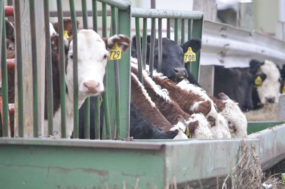Vaccinations will vary, depending on specific risks in a given herd. Timing will also vary, depending on the calving/breeding season.
Dr. Steve Hendrick, Coaldale Veterinary Clinic, Coaldale, Alberta, recommends vaccinating cows after calving and before breeding (or heifers pre-breeding) with the modified-live virus vaccines rather than while they are pregnant – to reduce the risks for abortion from vaccination. Pregnant cows should generally receive killed vaccines.
“Replacement heifers should be vaccinated with modified-live vaccines at least twice and preferably three times before their first breeding season,” he says. They can be vaccinated as calves and again post-weaning, and the last dose about a month before breeding.
This will give them a strong immunity before they become pregnant, thus protecting them from the viral diseases (IBR and BVD) that could result in abortion.
“If you purchase replacement heifers and don’t know what they’ve had for vaccination, you should vaccinate them several weeks before breeding. Giving modified-live vaccine just before breeding could be detrimental.
The IBR fraction of the vaccine has been shown to cause swelling of the ovaries, which could interfere with cyclicity; they wouldn’t be able to become pregnant until after that problem resolves. Even cows can have this problem, so we recommend giving these vaccines at least a month before breeding,” he explains.
Some people vaccinate cows just before they turn the bull out or before they take the cows to pasture. “This is not ideal, but in some cases it’s the only time they have the cows in the corral for vaccination. This is better than not vaccinating them at all and may be fine if it’s not their first vaccination,” says Hendrick.
“The biggest reason for vaccinating cows pre-breeding rather than at preg check is that we are trying to prevent diseases like BVD that can cause issues all the way through pregnancy. Make sure cows have optimal immunity before breeding so they have immunity throughout the pregnancy,” he explains.
“IBR, on the other hand, typically causes late-term abortions. In this case, preg check vaccination may be adequate, but we advise producers to work with their veterinarians to determine which diseases pose the biggest risk for their own herd.
Then they can choose the opportune time to vaccinate. My preference is to vaccinate pre-breeding, but I realize this doesn’t work for everyone,” says Hendrick.
“Vibrio and lepto are the most common bacterial diseases we vaccinate cows for, but we base this on herd history, and what they have experienced with pregnancy loss, if we’ve been able to confirm this with diagnostics,” he says.
If cattle are going to communal pastures for summer grazing/breeding, it pays to vaccinate the cows. In a healthy herd that has a 95 percent or greater pregnancy rate year after year in a 60-day breeding season, chances of having vibrio are low.
“If they are not having abortion issues with leptospirosis, and there’s not much risk for vibrio, these herds may not need to be vaccinated for these diseases,” he says.
“The combination vaccines that contain vibrio and lepto are not as protective for the vibrio portion as we’d like. The oil-adjuvanted vibrio vaccines, and even some of the killed IBR-BVD vaccines that are available with vibrio and lepto fractions, are probably more protective than modified-live vaccines with these added.
Part of the reason is: They have to be water-soluble to mix up the modified-live vaccines. They are not adjuvanted with oil. The oil acts as a carrier to create more depo for that vaccine (with longer-lasting effect), but they can’t do this with a modified-live product,” he says.
You are better off to use separate vaccines if you want optimum protection. You should be working with your veterinarian to figure out the issues and then utilize a vaccine that would provide the most protection in your herd. Even if it’s more expensive, the loss of one or two calves would more than pay for a certain vaccine for the herd.
“Lepto tends to cause mid- to late-term abortions, and if you are really concerned about lepto, you might consider vaccinating twice a year and not just pre-breeding. In some herds, it pays to give a second vaccination at preg check time or to check titers of those cows.
When I was at the vet college in Saskatchewan, we looked at titers of cows going out in the spring and coming back in the fall. We were surprised by a number of herds that vaccinated their cows in the spring, and by the time they came off pasture in the fall, their titers were low again.
The vaccine may not trigger as much antibody response as we would like,” he says.
The protection is short-lived, so you need to booster annually, and it may help to booster semi-annually in certain herds. With all vaccines, cattle need a primary series of injections at the proper timing to start the immunity (ideally when they are heifers). Then the annual or semi-annual vaccinations act as a booster.
“Immunity may also hinge on condition of the cows. If they’ve had a tough winter (short on feed, or severely cold weather), you may see poor immunity.
Nutrition goes hand in hand with immunity.” A cow can’t mount a good immune response to vaccine if she’s thin and stressed. If you go to the expense and effort to vaccinate cows pre-breeding, make sure they have optimum conditions to develop good immunity. ![]()
PHOTO: If cattle are going to communal pastures for summer grazing/breeding, it pays to vaccinate the cows. Staff photo.

-
Heather Smith Thomas
- Freelance Writer
- Salmon, Idaho
- Email Heather Smith Thomas








